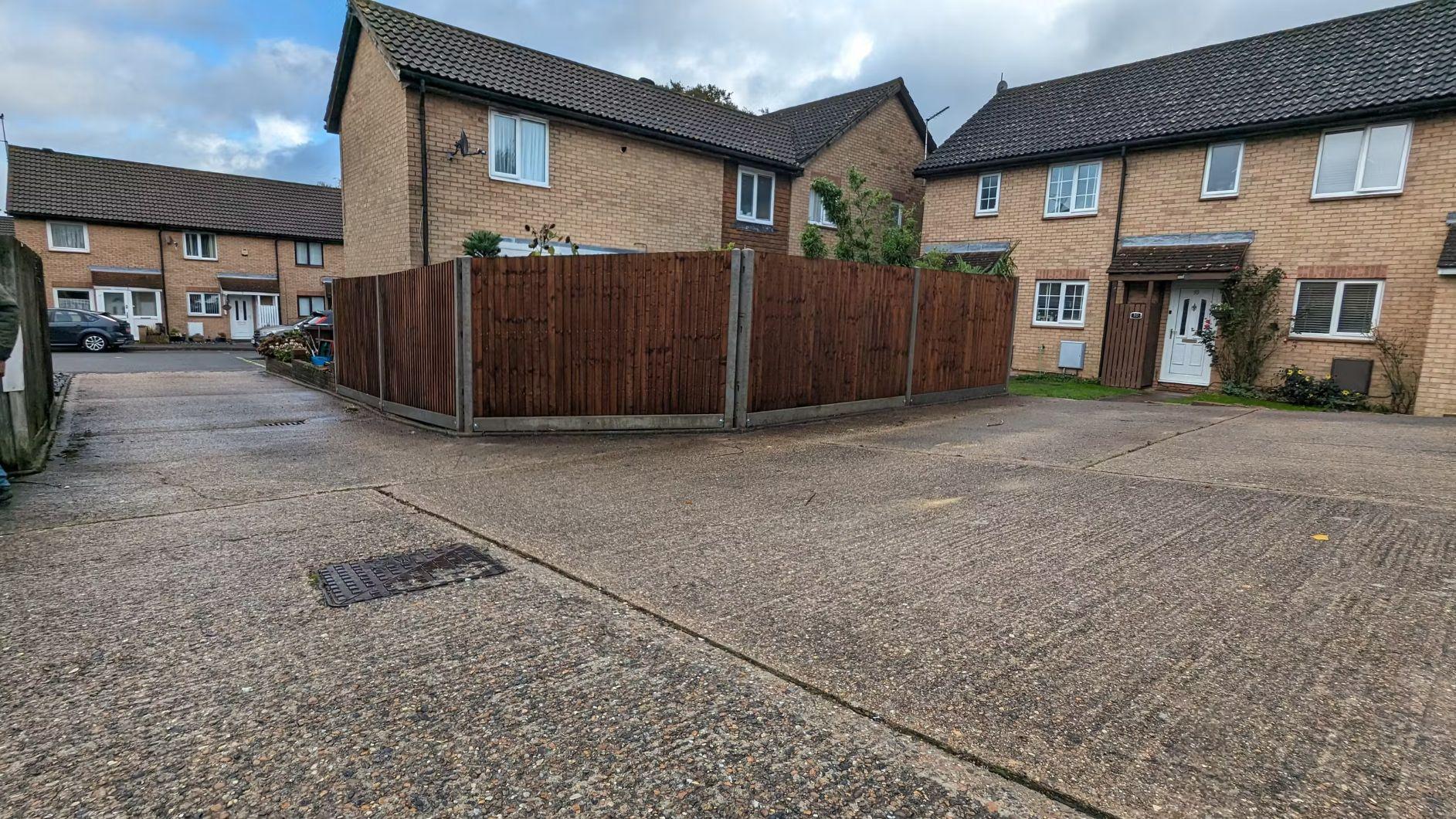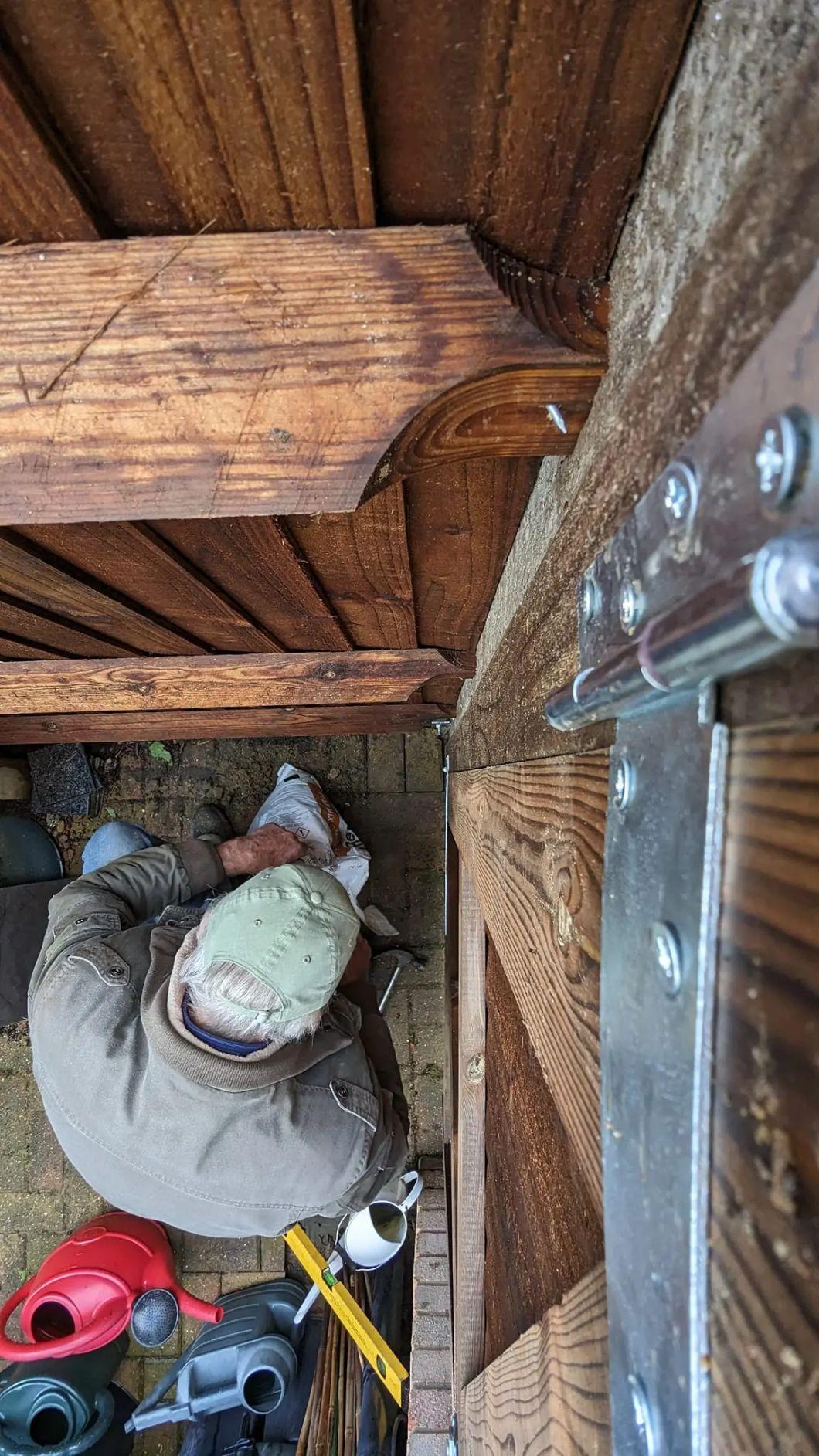Choosing the Right Fencing for Communal Carparks
A Guide to Tackling Tricky Boundaries
Communal carparks behind residential properties present unique challenges when it comes to fencing. With various angles, bends, and irregular boundary lines, traditional fencing methods often fall short. This comprehensive guide will help you navigate these complexities and choose the best fencing solution for your communal carpark.
The Communal Carpark Layout
Typically, these carparks feature a road between two houses leading to a shared parking area. The houses bordering this entrance often have the largest boundary fences within the carpark, which frequently include multiple angles and bends. This unique layout creates a series of irregular boundaries that require careful consideration when planning fencing solutions.
The shape of these carparks can vary significantly depending on the overall property layout. Some may be relatively rectangular, while others might have a more organic shape that follows the contours of the surrounding buildings and landscape. This variability adds to the complexity of choosing an appropriate fencing solution.
The Challenge of Irregular Boundaries
Standard fencing panels, usually 6 feet wide, can be problematic in these settings. Using them could result in numerous cuts and an excessive number of posts, leading to an unsightly fence. The rigid nature of these panels makes it difficult to follow the natural flow of irregular boundaries, often resulting in awkward gaps, uneven heights, or a zigzag appearance that detracts from the overall aesthetics of the space.
Moreover, the use of standard panels in such settings can lead to increased costs due to waste from cutting panels to fit odd angles and the need for additional posts to support these cut sections. This approach not only impacts the visual appeal but can also compromise the structural integrity of the fence over time.
The Solution: Closeboard Fencing
(This Closeboard fence was insatlled in Lordswood, Medway)
For communal carparks with irregular boundaries, closeboard fencing stands out as the recommended choice. This versatile fencing solution offers several advantages that make it particularly well-suited to the unique challenges of these spaces:
- Flexibility: Closeboard fencing offers unparalleled adaptability. You can create bays ranging from 2 feet to 10 feet wide, allowing the fence to flow naturally along irregular boundary lines. This flexibility is crucial when dealing with odd angles, curves, and varying distances between fixed points in the carpark layout.
- Customisation: This flexibility means you can tailor the fence to fit precisely around corners, angles, and curves without awkward cuts or gaps. Each section can be custom-fit to the specific requirements of your space, ensuring a seamless and professional appearance throughout the entire fencing run.
- Aesthetics: By avoiding numerous cuts and extra posts, closeboard fencing provides a cleaner, more professional look. The uniform appearance of the boards creates a sleek, continuous surface that enhances the overall appearance of the communal area. This can significantly improve the visual appeal of the carpark, contributing to a more pleasant environment for residents.
- Cleaner Lines: Unlike panel fencing, closeboard fencing eliminates step-ups, creating a smooth, continuous line along the top of the fence. This is particularly beneficial on sloping ground or uneven terrain, which is common in many communal carpark settings. The ability to maintain a level top line, even on challenging ground, adds to the polished look of the finished fence.
- Durability: Closeboard fencing is known for its sturdy construction. The overlapping boards and robust frame provide excellent resistance to wind and other weather conditions. This durability is especially important in communal areas that may be exposed to various environmental stresses.
- Privacy and Security: The solid nature of closeboard fencing offers enhanced privacy and security for the communal carpark. This can be particularly valuable in residential settings where protecting personal property and maintaining a sense of privacy are important considerations for residents.
- Noise Reduction: The solid construction of closeboard fencing can help to reduce noise transmission between the carpark and surrounding areas. This can be a significant benefit in densely populated residential areas, helping to maintain a peaceful environment for residents.
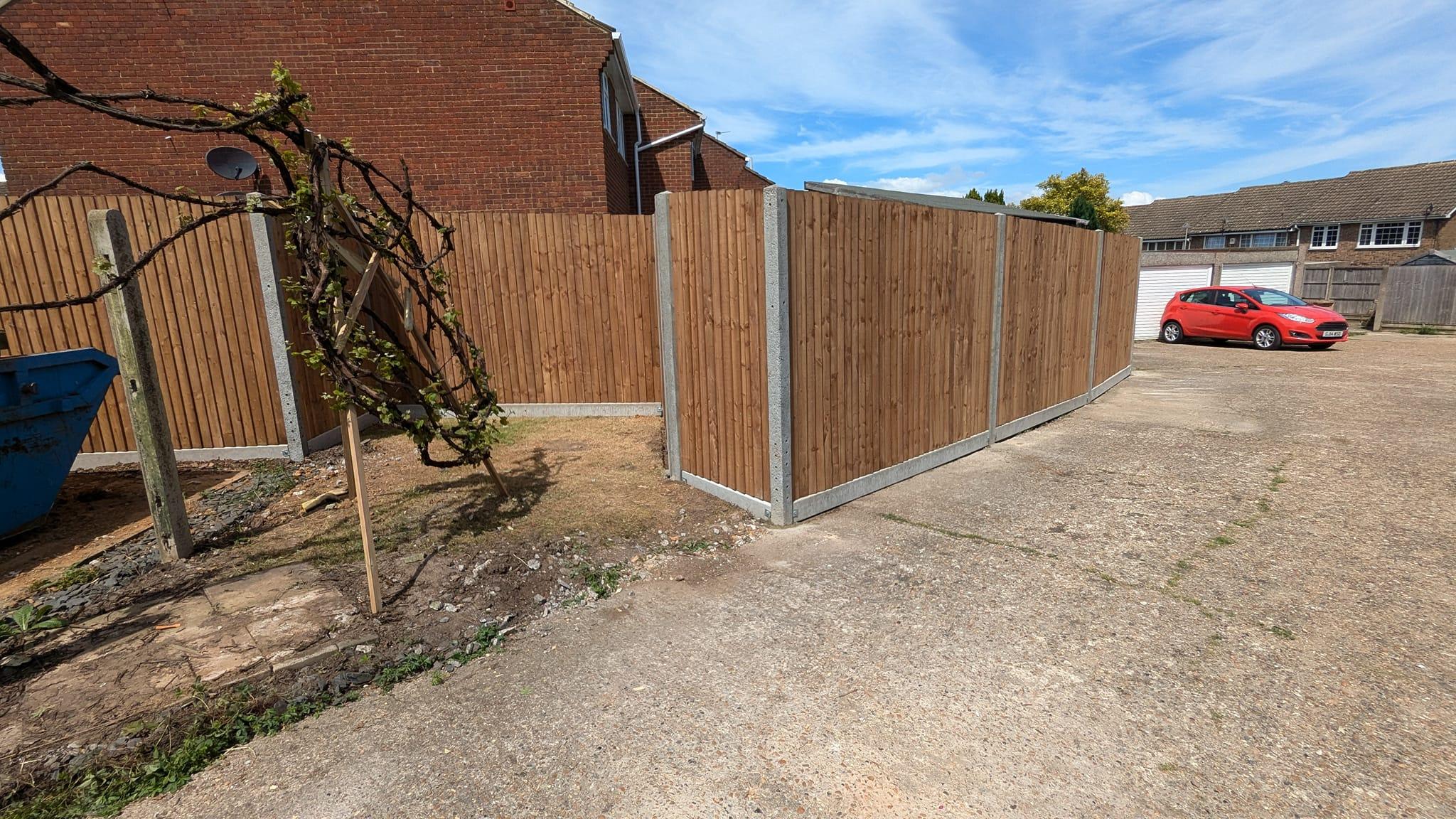
(This Closeboard fencing was installed in Strood, Medway)
Installation Tips for Closeboard Fencing in Communal Carparks
Proper installation is key to maximising the benefits of closeboard fencing in communal carparks. Here are some expanded tips to ensure a successful installation:
- Thorough Site Survey: Before beginning the installation, conduct a comprehensive survey of the boundary. Note all angles, curves, and potential obstacles. Pay special attention to changes in ground level and any existing structures that the fence will need to interface with. This detailed preparation will help prevent surprises during the installation process and ensure that you have all the necessary materials.
- Optimised Bay Planning: Plan your bay sizes carefully to minimise waste and optimise for the most challenging sections. In areas with significant curves or multiple angles, consider using smaller bays to achieve a smoother line. For longer, straighter runs, larger bays can be used to speed up installation without compromising on appearance.
- Quality Materials: Use pressure-treated timber for longevity, especially important in shared spaces that may be exposed to various weather conditions and potential impacts. The initial investment in high-quality, treated timber will pay off in the long run through increased durability and reduced maintenance needs.
- Height Considerations: Carefully consider the height of your fence. Check local regulations to ensure compliance, and balance the need for privacy with maintaining a welcoming community feel. In some cases, varying the height of the fence in different sections of the carpark can help achieve this balance.
- Gravel Boards: Incorporate gravel boards at the base of the fence. These help protect the main fence boards from ground moisture and potential damage from landscaping equipment, extending the life of your fence.
- Professional Installation: While closeboard fencing can be a DIY project, for large or complex communal carpark installations, professional installation is often worth the investment. Experienced fencers can navigate challenging aspects of the installation more efficiently and ensure a high-quality finish.
Additional Applications
While ideal for communal carparks, closeboard fencing is also an excellent choice for alleys with non-straight boundaries. The same benefits of flexibility and clean lines apply, making it a versatile solution for various challenging fencing scenarios.
In alleyways, closeboard fencing can provide much-needed privacy and security while adapting to the often narrow and irregular nature of these spaces. The ability to custom-fit each section ensures that the fence can navigate around obstacles such as protruding walls or changes in ground level that are common in alley settings.
Moreover, the use of closeboard fencing in alleys can significantly enhance the aesthetic appeal of these often-overlooked spaces. By presenting a uniform and well-maintained appearance, closeboard fencing can transform alleys from purely functional passageways into more pleasant and integrated parts of the overall property layout.
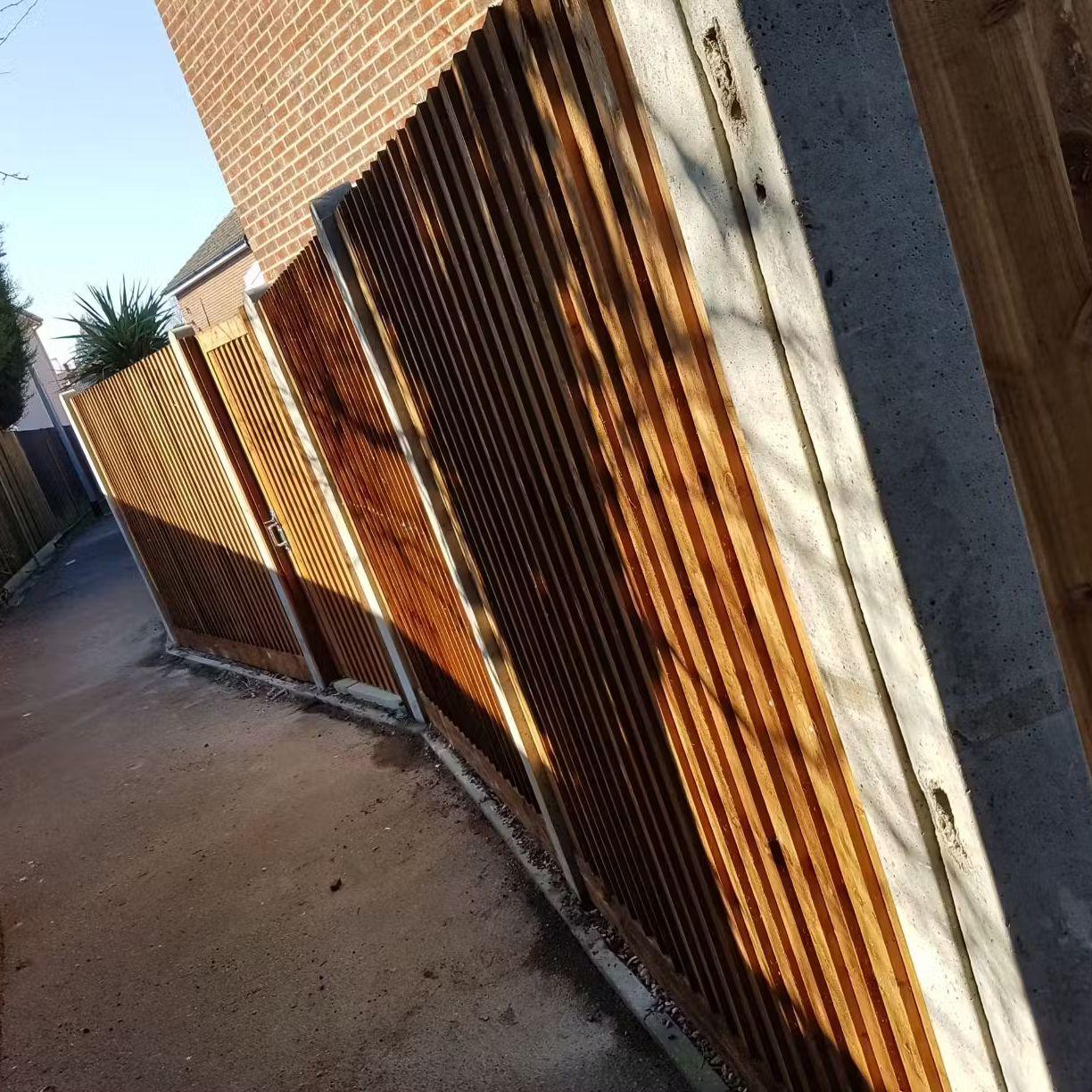
( This Alley way closeboarding was installed in Hempsted)
Maintenance and Longevity
To ensure the longevity of your closeboard fencing in communal carparks or alleys, regular maintenance is key:
- Annual Inspections: Conduct yearly checks for any signs of damage, loose boards, or deterioration.
- Cleaning: Periodically clean the fence to remove dirt, moss, or mildew buildup. This not only maintains appearance but also prevents moisture-related damage.
- Staining or Painting: Apply a protective stain or paint every few years to shield the wood from UV damage and moisture. This can also be an opportunity to refresh the look of the fence if desired.
- Prompt Repairs: Address any damage promptly to prevent it from worsening or affecting adjacent sections of the fence.
With proper care, a well-installed closeboard fence can last 15-20 years or more, providing long-term value for your communal space.
Conclusion
When fencing communal carparks or alleys with irregular boundaries, closeboard fencing offers the best combination of flexibility, aesthetics, and practicality. Its adaptability allows for a smooth, professional-looking fence that can handle all the quirks of your property's layout, providing a clean, continuous line without the step-ups often seen with panel fencing.
The benefits of closeboard fencing extend beyond mere functionality. By choosing this versatile fencing solution, you're investing in the overall appeal and security of your communal spaces. The clean lines and uniform appearance can significantly enhance the visual character of carparks and alleys, contributing to a more cohesive and attractive property overall.
Moreover, the durability and longevity of properly installed and maintained closeboard fencing make it a cost-effective choice in the long run. While the initial investment may be higher than some alternatives, the reduced need for repairs and replacements over time can result in significant savings.
Ultimately, the choice of fencing for your communal carpark or alley is about more than just marking boundaries. It's about creating spaces that are functional, secure, and aesthetically pleasing. Closeboard fencing, with its unique combination of adaptability and style, offers a solution that meets all these criteria, making it an excellent choice for those challenging irregular boundaries.
Professional Fencing Services
If you need assistance with your fencing project, Sheridan Fencing is here to help. Based in Lordswood, Medway, we serve Medway, Maidstone, Sittingbourne, Gravesend, and beyond. With 40 years of experience in installing and repairing fences, we have the expertise to tackle even the most challenging fencing projects.
Our team of skilled professionals understands the unique requirements of communal carpark and alley fencing. We pride ourselves on delivering high-quality installations that not only meet but exceed our clients' expectations. From the initial site survey to the final board placement, we ensure attention to detail at every step of the process.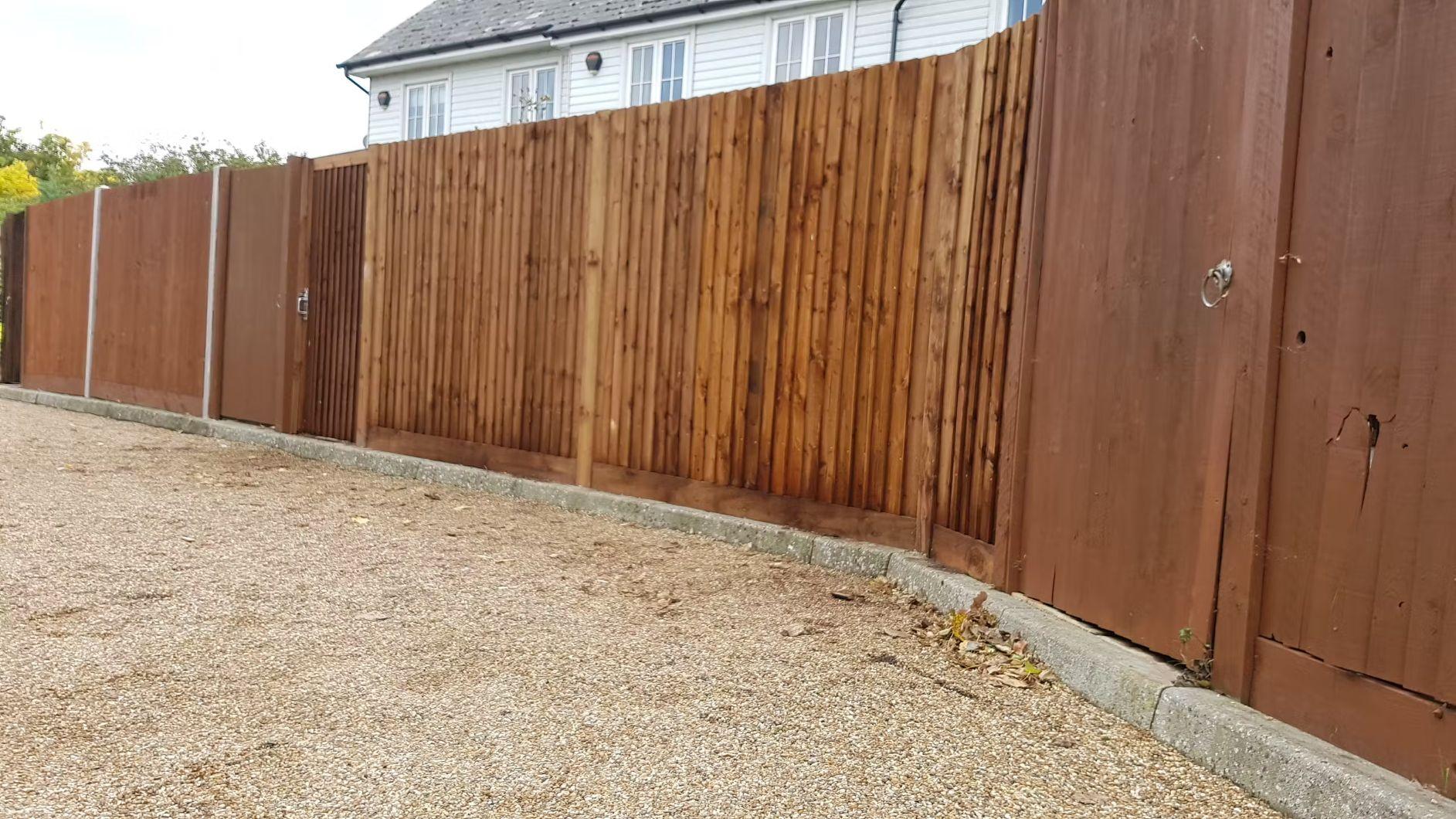
( This closeboard fencing was installed in lower Rainham)
Frequently Asked Questions For Carpark Fencing
- Q: How long does it take to install closeboard fencing for a typical communal carpark? A: The installation time can vary depending on the size and complexity of the project. On average, a small to medium-sized carpark might take 2-5 days. Larger or more complex projects could take longer. Factors that can affect the timeline include the condition of the existing site, weather conditions, and any necessary groundwork.
- Q: Is closeboard fencing more expensive than panel fencing? A: While the initial material cost may be higher, the overall cost can be comparable or even lower due to reduced labour and fewer posts required. Additionally, the longevity and lower maintenance needs of closeboard fencing often make it more cost-effective in the long run. It's best to get a detailed quote for your specific project to make an accurate comparison.
- Q: Can closeboard fencing be painted or stained? A: Yes, closeboard fencing can be painted or stained to match your preferred colour scheme or to protect the wood further. Many property owners choose to apply a protective stain that enhances the natural wood grain, while others opt for paint to match specific colour schemes. It's important to use products specifically designed for outdoor wood to ensure the best protection and longevity.
- Q: How long does closeboard fencing typically last? A: With proper maintenance, closeboard fencing can last 15-20 years or more. The lifespan can be extended through regular maintenance, including periodic staining or painting, prompt repairs of any damage, and keeping the fence clean. The quality of the initial installation also plays a significant role in the fence's longevity.
- Q: Can closeboard fencing be installed on uneven ground? A: Yes, this is one of the main advantages of closeboard fencing. It can easily follow the contours of uneven ground without leaving gaps underneath. The individual boards can be cut to fit the specific contours of your site, ensuring a neat finish even on challenging terrain. This flexibility makes it an excellent choice for sites with significant changes in ground level.
For more information or to request a quote, please contact Sheridan Fencing. Our experienced team is ready to assist you with your fencing needs, providing expert advice and high-quality installation services tailored to your specific requirements.
Sheridan fencing - Dave Relf


